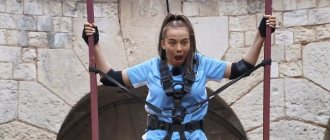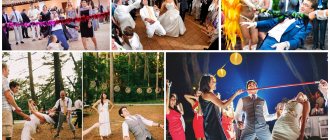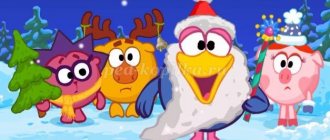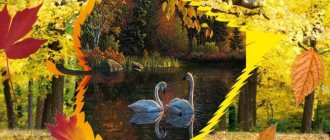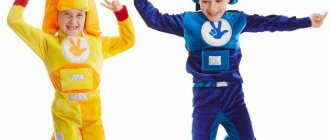If you love the Fort Boyard program and cool games as much as we do, this article is for you. We'll tell you how to give your children a real adventure in the spirit of their favorite show at no cost using the props at hand! This is a Fort Boyard quest scenario with team games, active entertainment and simple preparation. You will succeed following our detailed instructions.
We recommend conducting this quest for children from 6 to 12 years old - they are no longer kids, they know how to play together, and are not yet too old for activities. The Fort Boyard themed quest is a ready-made birthday party and great fun if you just need to keep the kids and their friends occupied. Team - from two to eight participants (after all, we have a home version of the game, and not for school or camp, but you can easily adapt our ideas to a larger number of players). The advantage of the game is that it is a team game - children do not compete with each other, but defeat a common opponent - in our quest it will be “Elder Fura”. Any adult who is ready to explain the rules of games to children and monitor their progress is suitable for his role. It would be great if you could find a cloak, a chain with a key, and any suitable makeup for the “old man.” Other adults usually join in the game with excitement, help the children or, conversely, create obstacles, help run the games - it’s very fun and family-like.
A little information : Fort Boyard (sometimes translated as Fort Bayard) is an abandoned defensive fortress on an island in France, which has its own gold fund (guarded by tigers). The task of the team of players is to complete various physical and intellectual tasks, get a certain number of keys and all together enter the treasury of the fort in order to collect as much gold as possible there in a limited time.
Quest Fort Boyard at home
1. The main thing that the team will be hunting for: the final prize , a gift, sweets, “gold” (chocolate gold coins or regular coins spray-painted in a box painted to look like a chest). In addition to sweets, we put in various stones and coins, like a real “treasure”.
2. Props for 8 games:
- Board, small nails and hammer;
- Pizza box, string, plasticine and a small ball;
- Two plastic cups and any pebbles or coins, a basin of water;
- A mop or any stick, thread, any magnet, tape;
- Checkers, paper and felt-tip pen;
- Clothesline or any similar line;
- Sushi chopsticks and a small ball;
- Unnecessary old keys (or draw them on paper).
We talk about the Fort Boyard quest at home, in an apartment, but if you are outside, you have even more room for children’s imagination and activity: increase the distances, include more running in the tasks.
Option to play with two teams: if children are over 9 years old, you can arrange a competition and divide them into 2 teams (no less than 3 and no more than 8 participants in each): give them insignia - colored bandanas or headbands. Then it is more convenient to have 2 presenters and teams to pass different tests in parallel.
How to conduct a quest
When the children are assembled, give them team paraphernalia (badges, headbands, bandanas of the same color), and let them come up with a team name and motto. Tell us the essence of the quest: pass all the tests and collect the maximum number of keys. And in the finale, exchange them for clues to the last riddle and get the fort’s gold! Immersion in the atmosphere will depend on the artistry of the presenter, don’t be shy, this is a game!
Warn that if there are 5-8 participants, then it will not be possible to play each test in a bunch at the same time: take turns, or for each test the host will choose who will play with him. If there are 2-4 players, then all the tests can be completed by all participants at the same time.
Hide the final prize for children in a secluded place in advance (so as not to be discovered by accident): it could be a cake, sweets, coins, small toys, etc.
1 challenge, Nails
The host and two players take turns hitting the nail, gradually hammering it into the board. Whoever made the last hit wins, if it is a player, gets the key. If the leader is the player, they do not receive the key. When there are more players, we repeat the tournament in threes.
The number of keys for this round is determined by the presenter.
2 test, Labyrinth
From a pizza box or any suitable piece of cardboard you need to make a labyrinth, with corridor walls made of plasticine. Attach strings to the four corners of the box. Strengthen the bottom so that it does not fold (if necessary).
Task for players: 2-4 participants take the ropes in their hands and raise/lower the edges of the maze so that the small ball rolls from the starting point to the finish without flying out of the maze. You need to work as a team and not make sudden movements.
The passage can be repeated so that everyone can participate. At the discretion of the presenter, he can issue a key only if the ball successfully passes through all passes.
Challenge 3, Sink the ship
Prepare a deep container or bowl of water. Immerse two cardboard or plastic cups in it, pre-weighting them with coins/pebbles so that they float at the same height. Place another pile of stones/coins nearby.
The test will be passed by the one whose ship stays afloat longer - the leader or the players. We take turns putting a pebble into the opponent’s glass (you cannot throw or help with your hands).
You can try another version of the game: now the players put pebbles in their glass, and the leader puts them in his. Caution will increase! Players may not receive a key in some tests - let everything be fair, this will add drive and interest. Before the final puzzle, they will have an attempt to catch up.
4 test, One, two, three
Prepare a fairly large pile of pencils. The leader and two or three players play. In turn, everyone can take 1, 2 or 3 pencils on their turn. Whoever takes the last pencil loses. A logic game, you can play it several times with different numbers of pencils.
Challenge 5, Fishing
Make a magnetic “fishing rod” from available materials: tie a strong thread to a mop stick, and attach any non-flimsy magnet to it with tape.
Place the keys on the floor at different distances from the starting line (if there are none, then coins will do). The players' task is to catch as many keys as quickly as possible, one at a time (or with two fishing rods in parallel, if you have two ready). These keys can then go into the general classification of keys, or issue one “credit” for all of them.
If space allows, let you run to the fishing spot and bring each key you catch to one place. The children will be happy and tired, which is also great.
6th test, Checkers
Draw a sequence of 10 black and white circles on a piece of paper in advance (or several different blanks so that the presenter does not remember and is on an equal footing with the players).
The leader and 2 players play (or more, but then you will need more checkers). For 20 seconds, everyone carefully looks at the sequence (let everyone sit on one side of it), then the presenter closes it and everyone tries to repeat the sequence exactly without making mistakes. This is not at all easy, as experience has proven! If the presenter made a mistake before everyone else or at least one player, then he lost. But if all the players were wrong, they didn’t win either.
You can repeat this: in each test, look at the mood of the players, all competitions and games should be fun and with excitement!
7 test, Blind and guides
For the test you will need a rope 2-3 meters long. Its thickness should be noticeable to the foot; you need to play barefoot or in socks.
One player is blindfolded, the leader lays out a “path” from the rope along any trajectory. Participants-guides, with their instructions, guide the “blind” person so that he walks exactly along the rope. We repeat the test several times, each time changing the “blind” and the path trajectory.
8 test, Don't drop the ball
Two participants play, each holding sushi sticks (or any small even sticks). There are two versions of the game, they depend on the age of the players - the older, the more difficult.
It’s simpler: you need to stand facing each other and walk a certain distance, holding a small ball together with chopsticks. More complicated: add “islands” from A4 paper. You also need to move some distance, but only across the islands. At the same time, while one stands on the island and holds the ball, the second moves his sheet, stands on it, receives and holds the ball, while the second moves his sheet too. The most difficult thing is to evenly pass the ball onto the sticks and hold it after that.
Sports and intellectual festival “Ford Boyard” for the senior preparatory group
Sports game in the senior, preparatory group. Scenario
Scenario of the sports and intellectual game "FORT BOYARD"
(for children of senior and preparatory groups of kindergarten)
Purpose: promotion of physical education and a healthy lifestyle among preschool children. Objectives: to give children a sense of joy from solving intellectual problems and from the game itself. Activate existing knowledge. Develop logical thinking, improve motor skills (walking, running, jumping, balance). Learn to establish communication in a joint game, promote group cohesion. Foster a sense of camaraderie, mutual assistance and hard work. Heroes: presenter, children participants, elder Fura. Equipment: recordings of melodies from the television game “Ford Boyard”, clue keys with letters, hourglass, gymnastic sticks 10 pcs., 5 balls, easel, crossword puzzle, hoops 4 pcs., chalk, skipping rope 2 pcs., 2 balloons with notes, notes with proverbs, skittles 6 pcs., a basket with notes, the Book of Secrets and the costume of Elder Fura, cards with the names of animals, candies in the form of coins, a diploma Presenter: - Hello, guys! Hello, dear guests! Today we have gathered to hold a sports and intellectual game “Fort Boyard”. Let's welcome the participants of this game. (The presenter invites each participant, briefly describing him) Presenter: - Guys, I invite you to an exciting journey to Fort Boyard. This is the name of the fortress that we must conquer. To win this game you need to guess the key word. This is not easy to do, you will have to go through many tests, but I hope that you will succeed. Do you agree? (Music sounds and Elder Fura appears). Guys, look, who came to our game? Who you are?
Fura: Hello, brave and courageous boys and girls! I am Elder Fura. It's hard to imagine Fort Boyard without me. I live at the very top of the fort, in the watchtower. In addition, I am also the Keeper of the Keys (shows a bunch of keys). Host: Guys, let’s all go on our journey together. Fura: Before we move on to complex sports and logical tasks, I suggest doing a physical warm-up. (game “Turnip”, two teams of 6 people (grandfather, grandmother, granddaughter, bug, cat, mouse), on the opposite side of the players there are two chairs. On each chair sits a turnip - a child in a hat with a picture of a turnip. The grandfather starts the game. At the signal, he runs to the turnip, runs around it and returns, the grandmother clings to him (takes him by the waist) and they continue running together, again run around the turnip and run back, then the granddaughter joins them, etc. At the end of the game, the mouse is joined by a turnip).
Host: - Guys, do you have a motto? Children participating: 1st team: “We are preschool children who came to Fort Boyard to play. And our motto is to win!” Team 2: “We are ready, as always, to defeat you without difficulty.” Fura: - Well done! Guys, remember that the time for completing all tasks will be controlled by an hourglass. So, the first test. You need to use sticks to move all the balls from one side of the court to the other. Let's see how you work together in pairs. This test is called “Friendly Couples”. You must stand in pairs, pick up sticks and use them to move the balls.
After this, the presenter asks to find a note on one of the sticks with a task that needs to be completed (“Solving a crossword puzzle” (on an easel). PROFESSIONS 1. He prepares lunch in the dining room. - COOK. 2. He sits at the cash register and receives money from customers. – CASHIER. 3. He treats. – DOCTOR. 4. He teaches children at school. – TEACHER. 5. He flies. – PILOT. 6. He paints the fence, walls, ceiling. – PAINTER. 7. He fishes. – FISHERMAN. 8. He works in the mine. – MINER. 9. He builds houses. – BUILDER. 10. He sews beautiful things. – TAILOR. If the crossword puzzle is solved correctly, then in the highlighted vertical cells you can read who cuts people’s hair. – HAIRDRESSER.)
Fura: For the correct solution of the crossword puzzle, the captain brings a clue. Presenter: - Well done! You completed the first task. Let's move on to the next task - “Hoop Race”. (lines of 20-25 m are drawn on the track, one from an arc) Each player must roll the hoop from the first to the second line, come back and pass the hoop to his friend. The team that finishes the relay first wins.
Host: For correctly completed tasks, the captain again brings a hint key. Fura: - Good guys! You have already won two keys. The next task, “Take Your Word,” awaits you ahead. You will need to overcome an obstacle (jumping rope on one leg), take a balloon from the table in which the word will be written, and run back to the team. Next, you will need to make a proverb from these words within a certain time (“Don’t have 100 rubles, but have 100 friends”, “Friends are known in trouble”, “A new thing is good, but a friend is old”, “If you don’t have a friend, look for but if you find it, take care”). For a correctly composed proverb, the captain brings the next clue.
Presenter: - Well done! Your piggy bank has been replenished with another hint - a key. And we move on to the next challenge, “Obstacle Course.” A line of pins and hoops is constructed. It is necessary to run around the pins, jump from hoop to hoop, take a note from the basket and bring it to the team, if the note with a riddle participants begin to guess (rebus): (li 100 k; 100 lb)
Host: - You guys are just great! After four tests you have 4 hint keys.
Fura: Your tests took a lot of time! I am convinced that you are inquisitive, smart, dexterous, fast and confidently moving towards victory. And look what I have. (shows the book) This is my Book of Secrets, it contains a great many mysteries that sometimes baffle the smartest players. And I want to tell you some riddles to your parents. Whoever guesses the most will receive a clue. 1. She herself is a baby, afraid of a cat, lives under the floor, carries everything there. (Mouse) 2. The living castle grumbled and lay down across the door. Two medals on the chest. Better not go into the house! (Dog) 3. Mustachioed muzzle, striped coat, Often washed, but not familiar with water. (Cat) 4. Who carries his house on himself? (Turtle) 5. Jumping along the branches, but not a bird, Red, not a fox. (Squirrel) 6. He is both slender and handsome, He has a thick mane! He uses his hooves - clack-clack! Take me for a ride, buddy! (Horse) 7. A ball is rolling through the forest. It has a thorny side. He hunts at night for beetles and mice. (Hedgehog) 8. White in winter, and gray in summer. He doesn’t offend anyone, but he’s afraid of everyone. (Hare) 9. In summer he walks without a road between pines and birches, And in winter he sleeps in a den, hiding his nose from the frost. (Bear) 10. An evil green steamer lives in the rivers of Africa! (Crocodile) (If they cannot guess the riddle, the elder asks leading questions. When all the riddles have been guessed, the elder gives the children a clue key). Presenter: Good guys! And here is the last final test “Relay of Animals”. Teams line up in columns one at a time. The players are called “bears,” the second “wolves,” the third “foxes,” the fourth “hares,” and the fifth “horse.” A starting line is drawn in front of those in front. At the command of the leader, team members must jump to a given place just like real animals do. (After completing the task, the captain is given the last clue key.)
Host: So, all the tests have been passed. The hint keys, and there are 6 of them, are in your hands. The most important thing left is to unravel the keyword, but to do this you need to unite. From the collected keys you need to create a keyword. And you are given 2 minutes to do this. (After the allotted time has expired, the presenter checks the correctness of the collected word “FRIENDSHIP”. Elder Fura thanks the children for the game, presents the children with chocolates and coins and presents the group teachers with a participation certificate).
We recommend watching:
Sports game program for children of senior preschool age Sports relay race for children and parents of kindergarten. Senior group Sports festival for older preschoolers. Scenario: Sports festival in kindergarten “Dad, Mom, I – a sports family.” Scenario
Similar articles:
Scenario of a sports festival for older preschoolers for City Day
Sports festivals in kindergarten and senior group. Scenarios
Physical education holidays and leisure in kindergarten. Scenarios



